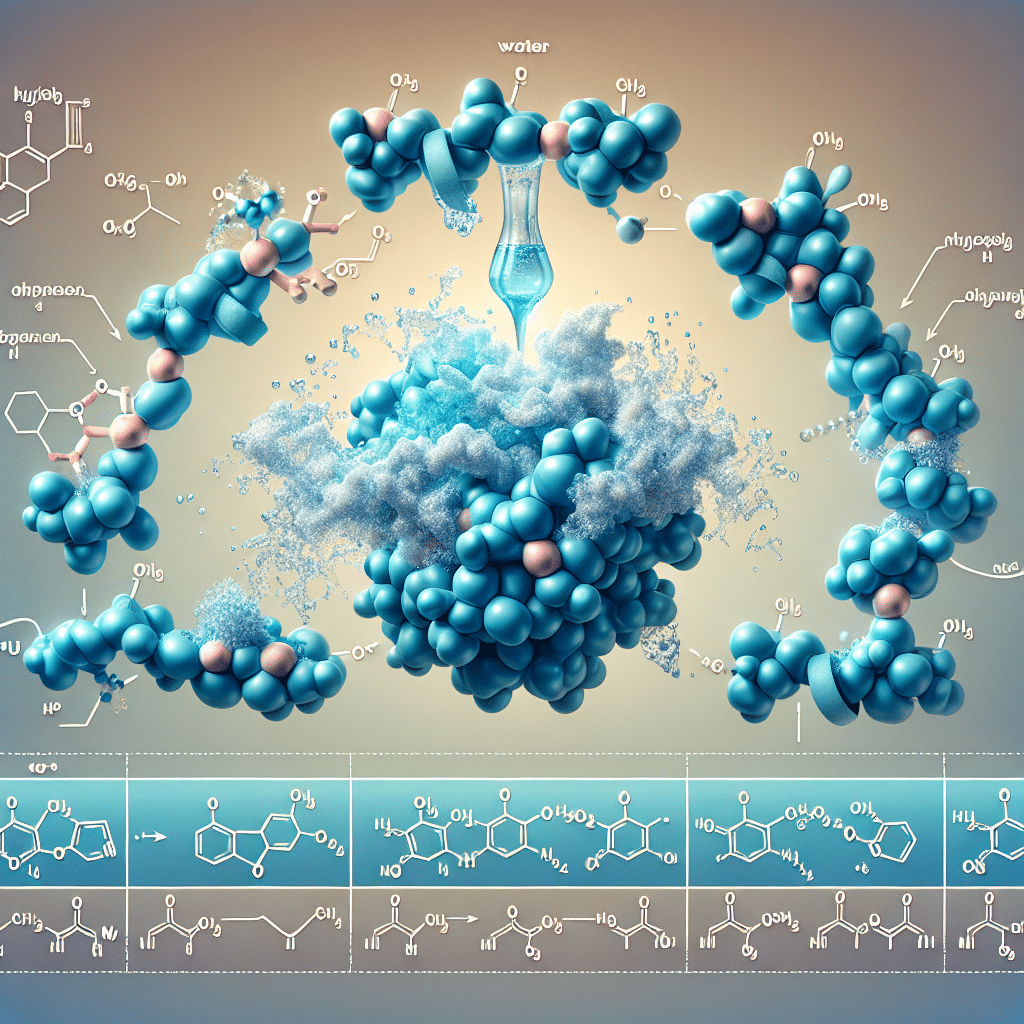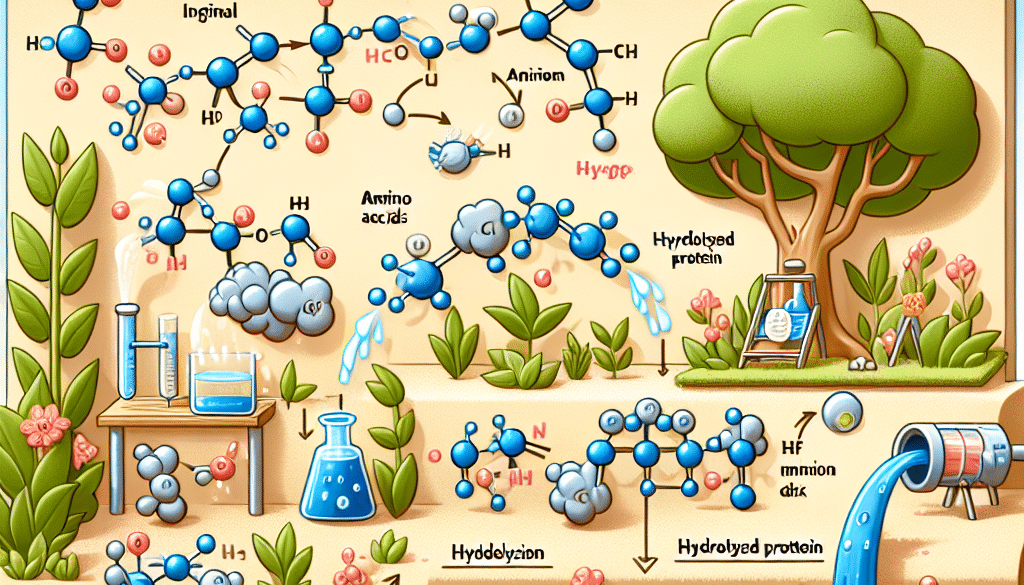What Is Hydrolyzed Protein Made From?
-
Table of Contents
Hydrolyzed Protein: Understanding Its Sources and Benefits

Proteins are fundamental to our nutrition, serving as the building blocks of life. They are essential for the growth, repair, and maintenance of our body’s tissues. However, not all proteins are created equal, and the way they are processed can significantly affect their nutritional value and digestibility. One such form of processed protein is hydrolyzed protein. In this article, we will delve into what hydrolyzed protein is made from, its benefits, and its applications in various industries.
What is Hydrolyzed Protein?
Hydrolyzed protein is a form of protein that has been broken down into smaller peptides or amino acids. This process, known as hydrolysis, involves the use of water to break the peptide bonds that hold protein molecules together. The result is a product that is easier for the body to absorb and digest, making it an ideal ingredient for individuals with digestive issues or for use in specialized nutrition products.
Sources of Hydrolyzed Protein
Hydrolyzed protein can be derived from various sources, including animal and plant-based proteins. Here are some of the most common sources:
- Whey Protein: Derived from milk during the cheese-making process, whey protein is a complete protein containing all nine essential amino acids. Hydrolyzed whey protein is a popular choice in sports nutrition due to its rapid absorption rate.
- Casein Protein: Also found in milk, casein protein is known for its slow digestion, making it a good option for sustained protein release. Hydrolyzed casein is often used in medical nutritional products.
- Soy Protein: Extracted from soybeans, soy protein is a plant-based option that is also considered a complete protein. Hydrolyzed soy protein is commonly found in vegetarian and vegan products.
- Collagen: Sourced from animal connective tissues, collagen is rich in specific amino acids that support skin, joint, and bone health. Hydrolyzed collagen, or collagen peptides, is easily absorbed and used in beauty and health supplements.
- Rice and Pea Protein: These plant-based proteins are often combined to provide a complete amino acid profile. Hydrolyzed versions are used in hypoallergenic formulas and vegan nutrition products.
Benefits of Hydrolyzed Protein
Hydrolyzed protein offers several advantages over its non-hydrolyzed counterparts:
- Enhanced Absorption: The smaller peptides are more easily absorbed by the body, making hydrolyzed protein an efficient source of nutrition.
- Reduced Allergenicity: Hydrolysis can reduce the allergenic potential of certain proteins, making them suitable for individuals with food sensitivities.
- Improved Texture and Solubility: Hydrolyzed proteins often have better solubility and can improve the texture of food and beverage products.
- Increased Muscle Recovery: The rapid absorption of hydrolyzed whey protein, for example, can help accelerate muscle recovery post-exercise.
Applications of Hydrolyzed Protein
Hydrolyzed proteins are used in a variety of products across different industries:
- Sports Nutrition: Protein powders, bars, and ready-to-drink shakes often contain hydrolyzed proteins to support muscle recovery and growth.
- Infant Formula: Hydrolyzed proteins are used in infant formulas to mimic the digestibility of breast milk and reduce the risk of allergies.
- Medical Nutrition: Patients with malabsorption issues or those requiring tube feeding may benefit from hydrolyzed protein formulas.
- Beauty Products: Hydrolyzed collagen and keratin are common ingredients in skincare and haircare products for their purported benefits to skin elasticity and hair strength.
Case Studies and Statistics
Research has shown the effectiveness of hydrolyzed proteins in various applications. For instance, a study published in the “Journal of the International Society of Sports Nutrition” found that athletes consuming hydrolyzed whey protein experienced improved recovery and reduced muscle soreness compared to those consuming non-hydrolyzed protein. Additionally, the global market for hydrolyzed collagen is expected to grow significantly, with a projected compound annual growth rate (CAGR) of 6.5% from 2020 to 2027, according to a report by Grand View Research.
Conclusion
Hydrolyzed protein is a versatile and highly beneficial form of protein that caters to a wide range of dietary needs and preferences. Its ability to enhance absorption, reduce allergenicity, and improve product texture makes it a valuable ingredient in sports nutrition, infant formula, medical nutrition, and beauty products. As consumer demand for easily digestible and hypoallergenic protein sources continues to rise, hydrolyzed proteins are likely to play an increasingly important role in the food and health industries.
Discover ETprotein’s Premium Hydrolyzed Protein Products
If you’re looking for high-quality hydrolyzed protein products, ETprotein offers a range of options to meet your needs. Their extensive selection includes organic rice protein, pea protein, and various seed proteins, all characterized by a neutral taste, non-GMO, and allergen-free attributes. With a commitment to purity and quality, ETprotein’s offerings cater to industries such as nutraceuticals, pharmaceuticals, cosmeceuticals, and food and beverage. To explore their products and learn more about how they can benefit your business or personal health goals, contact ETprotein today.
About ETprotein:
ETprotein, a reputable protein and L-(+)-Ergothioneine (EGT) Chinese factory manufacturer and supplier, is renowned for producing, stocking, exporting, and delivering the highest quality organic bulk vegan proteins and L-(+)-Ergothioneine. They include Organic rice protein, clear rice protein, pea protein, clear pea protein, watermelon seed protein, pumpkin seed protein, sunflower seed protein, mung bean protein, peanut protein, and L-(+)-Ergothioneine EGT Pharmaceutical grade, L-(+)-Ergothioneine EGT food grade, L-(+)-Ergothioneine EGT cosmetic grade, L-(+)-Ergothioneine EGT reference grade and L-(+)-Ergothioneine EGT standard. Their offerings, characterized by a neutral taste, non-GMO, allergen-free attributes, with L-(+)-Ergothioneine purity over 98%, 99%, cater to a diverse range of industries. They serve nutraceutical, pharmaceutical, cosmeceutical, veterinary, as well as food and beverage finished product distributors, traders, and manufacturers across Europe, USA, Canada, Australia, Thailand, Japan, Korea, Brazil, and Chile, among others.
ETprotein specialization includes exporting and delivering tailor-made protein powder and finished nutritional supplements. Their extensive product range covers sectors like Food and Beverage, Sports Nutrition, Weight Management, Dietary Supplements, Health and Wellness Products, and Infant Formula, ensuring comprehensive solutions to meet all your protein needs.
As a trusted company by leading global food and beverage brands and Fortune 500 companies, ETprotein reinforces China’s reputation in the global arena. For more information or to sample their products, please contact them and email sales(at)ETprotein.com today.














